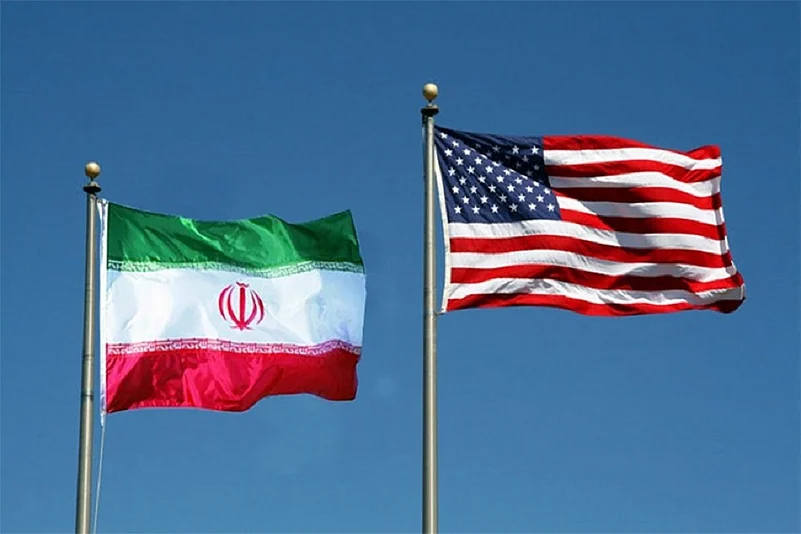The United States has notified UN Secretary General Antonio Guterres of its decision to trigger a 'snapback' that will initiate restoration of all UN sanctions on Iran, saying Washington will never allow "the world's largest state sponsor of terrorism" to freely buy and sell any kind of conventional weapons.
Secretary of State Michael Pompeo visited the UN headquarters on Thursday and met Guterres as well as the president of the UN Security Council for the month of August, Indonesian Ambassador Dian Triansyah Djani, to deliver letters notifying them that the US was initiating the restoration of virtually all UN sanctions on Iran lifted under the UN Security Council Resolution 2231.
Under this, the sanctions will come back into effect in 30 days from August 20.
"Our message is very, very simple. The United States will never allow the world's largest state sponsor of terrorism to freely buy and sell planes, tanks, missiles, and other kinds of conventional weapons. These UN sanctions will continue the arms embargo," Pompeo told reporters at the UN.
He said the "restored sanctions will also reimpose accountability for other forms of Iranian malign activity that the authors of the nuclear deal foolishly downplayed. Iran will be again prohibited from ballistic missile testing. Iran will be back under sanctions for ongoing nuclear activities – such as the enrichment of nuclear material – that could be applied to a nuclear weapons programme".
Last week, the US had suffered a diplomatic defeat when the UN Security Council rejected a proposal by Washington to indefinitely extend an arms embargo on Iran. The Trump Administration had threatened that it would initiate a "snapback" to reimpose all UN sanctions on Iran.
US President Donald Trump had in May 2018 pulled the US out of the 2015 landmark nuclear deal with Iran, an Obama-era accord which he has repeatedly criticised as "disastrous", and re-imposed sanctions.
The US was joined by the Dominican Republic in favor of the proposal to extend the Iranian arms embargo, which expires on October 18. Russia and China had voted against, while all other council members, including France, Germany, the UK, Indonesia and South Africa, had abstained.
US Permanent Representative to the UN Ambassador Kelly Craft had said that the under Resolution 2231, the US has every right to “initiate snapback” of provisions of previous Security Council resolutions. "In the coming days, the United States will follow through on that promise to stop at nothing to extend the arms embargo."
The so-called "snapback" mechanism, which was envisioned in the 2015 nuclear deal, would restore all UN sanctions on Iran if it was found that Tehran was in violation of the accord.
Pompeo said Germany, France, and the United Kingdom – the E3 – had told him "privately that they don't want the arms embargo lifted either" yet they have provided no alternatives or options.
"No country but the United States had the courage and conviction to put forward a resolution. Instead, they chose to side with ayatollahs. Their actions endanger the people of Iraq, Yemen, Lebanon, Syria – and indeed, their own citizens as well," he said.
In a statement, the foreign ministers of France, Germany and the UK said the US has requested to initiate the "snapback" mechanism, which allows a participant to the Joint Comprehensive Plan of Action (JCPoA) to seek the reimposition against Iran of the multilateral sanctions lifted in 2015 in accordance with resolution 2231, adopted by the UN Security Council.
They said the US ceased to be a participant to the JCPoA following their withdrawal from the deal on May 8, 2018. "We cannot support this action which is incompatible with our current efforts to support the JCPoA," the statement said.
The E3 called on all UNSC members to refrain from any action that would only deepen divisions in the Security Council or have serious adverse consequences on its work.
"We remain committed to the JCPoA despite the significant challenges caused by US withdrawal. We believe that we should address the current issue of systematic Iranian non-compliance with its JCPoA obligations through dialogue between JCPoA participants, including through the Joint Commission and use of the Dispute Resolution Mechanism.
"In order to preserve the agreement, we urge Iran to reverse all measures inconsistent with its nuclear commitments and return to full compliance without delay," the E3 ministers said.
They added that they have serious concerns regarding the implications for regional security of the scheduled expiry of the UN conventional arms embargo, "particularly given Iran's destabilising activities, which continue unabated".
Pompeo said Trump and his administration have discarded the "fiction" that the regime merely seeks a peaceful nuclear program.
"We will never allow the Islamic Republic of Iran to have a nuclear weapon. Our actions today too should come as no surprise to anyone. Our team has made every diplomatic effort over now almost two years to renew this arms embargo," he said.
He added that the American leadership begins with "recognising the Islamic Republic of Iran for what it truly is: a theocratic, revolutionary, brutish regime that will not voluntarily seek peace or make life better for the Iranian people".
"The one-sided, foolish nuclear deal did not bring security for America, it did not bring stability to the Middle East, nor did it moderate the regime's behaviour."
Pompeo added that the US decision puts additional pressure on Iran to behave like a normal country and to come back to the bargaining table.
"We call on the international community to join us in crafting a stronger deal that addresses the full range of Iran's malign behaviour and protects people of all nations that simply want to live free from Iranian predation," he said.

























